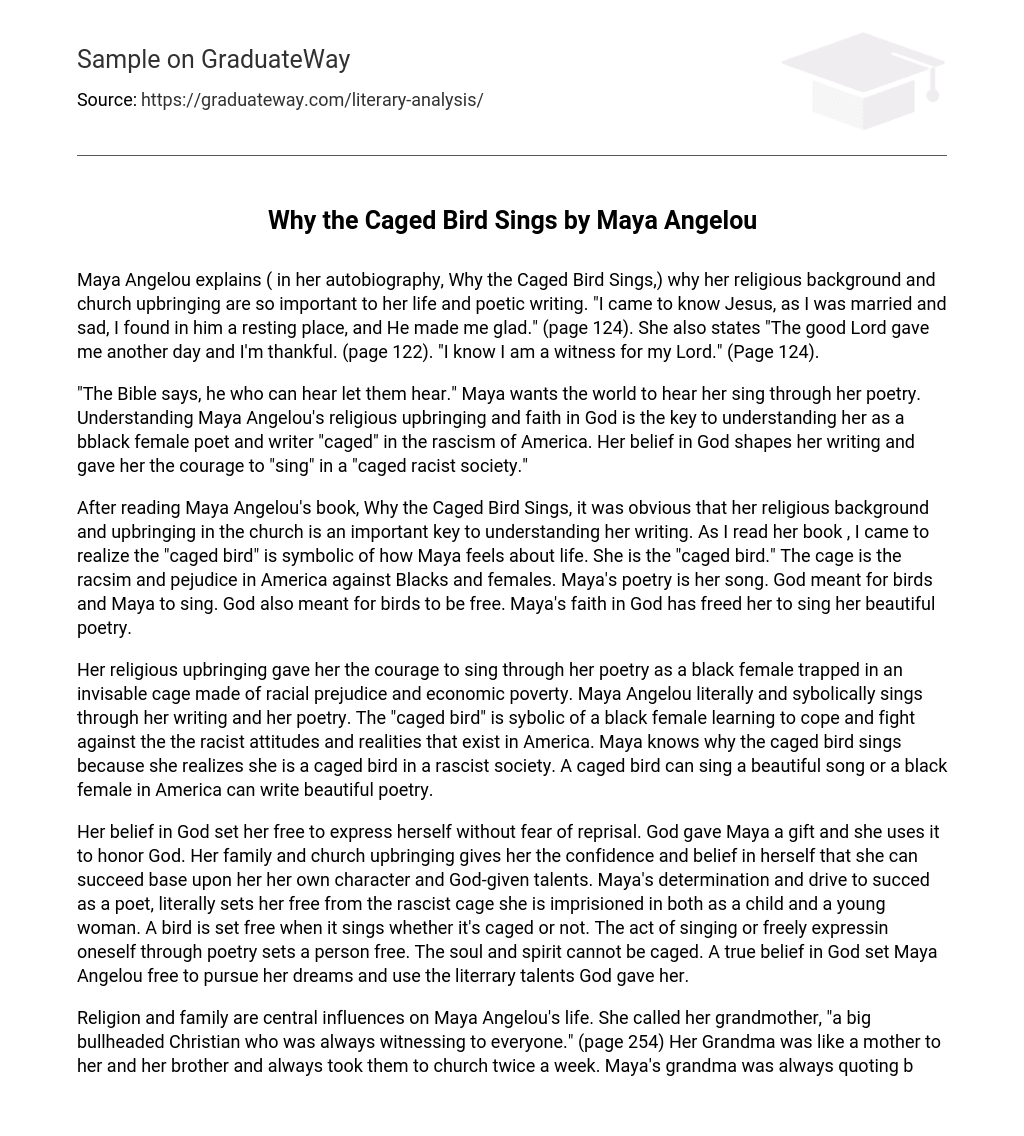In her autobiography, “Why the Caged Bird Sings,” Maya Angelou emphasizes the significance of her religious background and church upbringing in her life and poetry. According to Angelou, her relationship with Jesus became essential when she was feeling unhappy in her marriage, as she found solace and happiness in Him (page 124). Additionally, she expresses gratitude for being given another day by the Lord (page 122). Angelou firmly believes that she serves as a witness for her Lord (Page 124).
According to the Bible, those who are capable of listening should listen. Maya’s desire is for the world to hear her singing through her poetic works. To fully comprehend Maya Angelou as a black female poet and writer, it is essential to grasp her religious upbringing and her faith in God. This faith has had a profound impact on her writing, empowering her to bravely express herself within a racially oppressive society.
After reading Maya Angelou’s book, “Why the Caged Bird Sings”, it became evident that her religious upbringing in the church plays a vital role in comprehending her writing. Throughout the book, I realized that the “caged bird” symbolizes Maya’s perception of life – she herself is the “caged bird”. The cage represents the racism and prejudice faced by African Americans and females in America. In Maya’s poetry, she finds her voice. Just as birds were intended to sing by God, so was Maya meant to express herself through her poetic talent. Furthermore, God intended for birds to be free, just as Maya’s faith in Him has liberated her to share her beautiful poetry.
Maya Angelou, a black female, writes and sings through her poetry, finding the courage to overcome racial prejudice and economic poverty. Her religious upbringing inspires her to express herself and fight against the discriminatory attitudes and harsh realities of American society. The metaphor of the “caged bird” represents a black female’s struggle to cope and resist racism, reflecting Maya’s own experience as a marginalized individual. In this way, Maya understands the reason behind the beautiful song of a caged bird – it resonates with her own journey as a talented black female poet in a racially divided nation.
Maya Angelou’s fearless expression of herself, without fear of consequences, is attributed to her belief in God. She uses the gift bestowed upon her by God to honor Him. The confidence and self-assurance she possesses come from her upbringing in a family and church environment, which allows her to believe in her own abilities and potential for success. Maya’s unwavering determination and passion for poetry effectively free her from the oppressive confinement of racism that affected her during both youth and young adulthood. Similar to a singing bird, artistic expression or freely expressing oneself through poetry leads to freedom. The soul and spirit cannot be restricted or held back. Maya Angelou’s genuine faith in God gave her the freedom to pursue her aspirations using the literary talents given to her by God.
Maya Angelou’s life is deeply shaped by her religious upbringing and close-knit family. Her grandmother, whom she regards as a mother figure, plays a significant role in her spiritual development as a devout Christian. Together, they attend church twice a week where Maya’s grandmother not only shares her beliefs with others but also employs biblical scripture to impart valuable life lessons, much like Jesus Christ himself did. Maya’s unwavering faith in having accepted Jesus into her heart provides comfort and assurance that she will find eternal peace in Heaven. This profound belief empowers Maya to live fearlessly and express herself freely through the medium of singing.
Church gatherings have a significant influence on Maya’s life. During these gatherings, she has the opportunity to learn about God’s teachings and interact with both her peers and elder members of the community. These gatherings offer Maya acceptance and provide her with the social and spiritual freedom she has longed for, allowing her to break free from the oppressive racial constraints that have affected her people. Despite being confined, Maya finds solace in singing, just like a “caged bird.” Through her faith in God, Maya is empowered to believe that she can achieve anything, as exemplified by the old Negro Hymnal’s declaration, “We shall overcome.” The religious revivals serve as a unifying force for Maya’s entire community, uniting people from different churches and nearby communities and allowing them to come together as one. One distinct memory for Maya is that of a revivial where she felt the urge to stand up and bear witness, resulting in the salvation of twenty individuals. Through Jesus, God liberates them, granting them freedom from their figurative cages.
Maya Angelou, through her poetry, understands the reason behind the caged bird’s song. She explains that birds possess the inherent ability to sing granted by God, and this remains true even when they are confined. Maya reveals how her upbringing in the church and her unwavering belief in God have greatly influenced her life, allowing her to soar as one of America’s most acclaimed writers and poets. Her faith in God and her literary pursuits serve as the key to her ultimate freedom.
N/A





